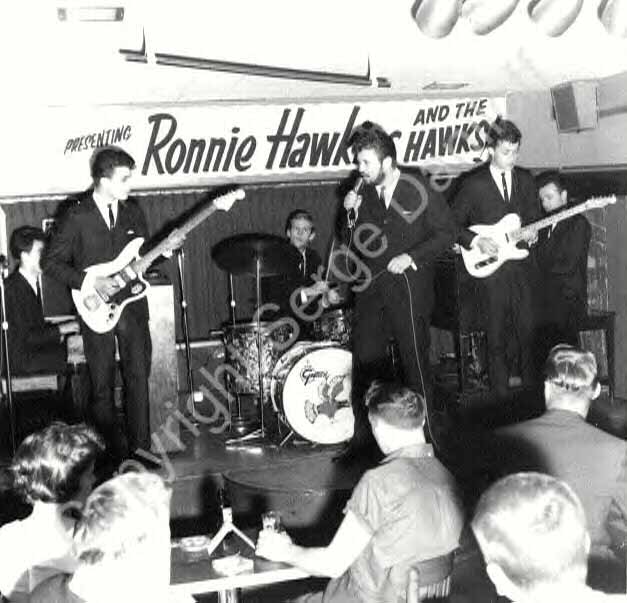The Hawk’s Majestic Flight
By David McGee
MOJO MAN/ARKANSAS ROCKPILE
Ronnie Hawkins
Collectors' Choice MusicAlthough the original albums represented in this Collectors' Choice two-fer, Mojo Man and Arkansas Rockpile, were issued in, respectively, 1967 and 1970, the 23 tracks on the CD were recorded between 1959 and 1963. At that time, Huntsville, AK-born Ronnie Hawkins was one of the most dynamic rock 'n' roll performers on the scene. In 1958, on the advice of Conway Twitty, Hawkins took his powerhouse band, the Hawks (which included a fellow Arkansas native in Helena's Levon Helm on drums), and relocated to Canada, from where he continued to launch incendiary rock 'n' roll assaults, with an even more formidable version of the Hawks, which came to include native Canadian Robbie Robertson, Rick Danko, Richard Manuel and Garth Hudson. His band went on to become The Band, but Hawk went on being Hawk, rarely (but always cleverly) departing from the blues- and rockabilly-based sounds and the big beat that drove audiences wild. Along the way he has produced a clutch of timeless recordings, not the least being his lone Top 40 hit, 1959's admonitory bopper, "Mary Lou," included on Arkansas Rockpile.
Among Mojo Man’s numerous delights is an astonishing, spitfire guitar solo courtesy Robbie Robertson on "What a Party," complementing a gritty lead vocal by Levon Helm, and a bottom-heavy, stomping treatment of Bobby Bland's "Further Up the Road," with Helm's lead vocal clearly showing the gutsy growling he took from Hawkins's style. Stylistically, Hawkins alternated between a tough, roadhouse sound and bigger, more atmospheric productions that included popish female background singers and exquisite melodies as fashioned by towering songwriters such as George Gershwin (whose "Summertime" is given a striking, Latin-tinged pop treatment sparked by Robertson's wailing, jagged guitar solo) and Hank Williams (by way of "Your Cheatin' Heart," done Nashville Sound style with a rich female chorus and Floyd Cramer adding his distinctive slip-note piano stylings on a session cut in 1960 with Music City's A team players and issued on the album Ronnie Hawkins Sings the Songs of Hank Williams; those Nashville sessions also produced a stone country topical number penned by Hawkins, "The Ballad of Caryl Chessman" (complete with backwoods banjo and insistent choral group chanting in gospel harmony, "Let him live/let him live"). Chessman was a convicted robber-rapist sentenced to death in the San Quentin gas chamber who became a cause célèbre in 1960 amid questions concerning the validity of the evidence against him; a stay was issued while the gas chamber was filling with fumes, too late to save Chessman. Hawkins's was the first of many songs centering on or referencing Chessman's plight, including Genesis's "Broadway Melody of 1974" and Neil Diamond's "Done Too Soon."
Bluesier and slightly darker than Mojo Man, Arkansas Rockpile leans heavily on cover versions, but Hawkins does most of them proud. Although his take on Larry Williams's "Dizzy Miss Lizzy" has plenty of energy, its arrangement is pedestrian and Hawk's vocal is rather strained, although a King Curtis sax solo is truly righteous in its urgent appeal. But Hawk reclaims his greatness and then some pretty quickly when gets to Billy Emerson's "My Gal is Red Hot," a roaring rewrite of Chuck Berry's "Forty Days" (titled "Thirty Days') and three take-no-prisoners versions of Bo Diddley tunes: "Who Do You Love" (the best version outside of Bo's original and his blistering remake for La Bamba) finds Hawk raising the ante by the second, each verse rising in intensity until the chorus arrives, when Hawk exits with a blood curdling scream, leaving the track to Robertson's heavily reverbed, searing guitar solos and Manuel's rocking roadhouse piano; "Say Boss Man" is a stomping, organ-enriched R&B exercise; and "Bo Diddley" is simply a wondrous steamrolling workout, with Robertson's sputtering solos supplying the exotic feel the original offered in Bo's shimmering guitar and Jerome Green's insistent maracas—a real virtuoso performance demonstrating Robertson's mastery of texture and dynamics. Add to these tasty selections "Mary Lou" and the obscure delight of "Come Love," a midtempo R&B grinder featuring Robertson crafting another masterful guitar solo, a wonder of tasteful restraint mated to heated expressiveness, with Hawkins's low-down vocal supported by a soaring, exuberant female chorus comprised of Dionne and Dee Dee Warwick. Voila! A classic, then and now.
A few years ago Hawkins was diagnosed with terminal pancreatic cancer. He sought help from a Canadian teenager known only as Adam, who promoted self-healing “energy” techniques, treating Hawkins with his regimen based only on a photograph of the artist. Within eight months Hawkins’s inoperable tumor had disappeared and he remains cancer-free today. As if a few rogue cells ever stood a chance against the Hawk. Please.
Note: The song sequence for Mojo Man is incorrect on the album cover and on iTunes when this CD is loaded. The correct sequence is: 1. Matchbox, 2. Suzy Q, 3. Southern Love, 4. What a Party, 5. One Out of a Hundred, 6. Mojo Man, 7. Lonely Hours, 8. Further Up the Road, 9. Ballad of Caryl Chessman, 10. Your Cheatin' Heart, 11. Summertime.
Also, Collectables Records (www.oldies.com) offers a healthy selection of Hawkins's original and more recent recordings on its website, including several two-fers, a 32-track Bear Family import overview of the artist's work (Ronnie Rocks), and an award winning 2004 documentary, Still Alive and Kickin', examining Hawk's life and times.
THE BLUEGRASS SPECIAL
Founder/Publisher/Editor: David McGee
Contributing Editors: Billy Altman, Derk Richardson
Logo Design: John Mendelsohn (www.johnmendelsohn.com)
Website Design: Kieran McGee (www.kieranmcgee.com)
Staff Photographers: Audrey Harrod (Louisville, KY; www.flickr.com/audreyharrod), Alicia Zappier (New York)
E-mail: thebluegrassspecial@gmail.com
Mailing Address: David McGee, 201 W. 85 St.—5B, New York, NY 10024
Founder/Publisher/Editor: David McGee
Contributing Editors: Billy Altman, Derk Richardson
Logo Design: John Mendelsohn (www.johnmendelsohn.com)
Website Design: Kieran McGee (www.kieranmcgee.com)
Staff Photographers: Audrey Harrod (Louisville, KY; www.flickr.com/audreyharrod), Alicia Zappier (New York)
E-mail: thebluegrassspecial@gmail.com
Mailing Address: David McGee, 201 W. 85 St.—5B, New York, NY 10024


